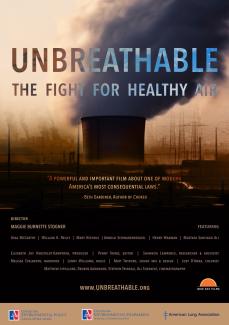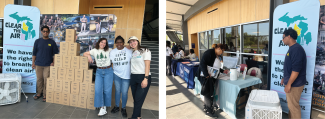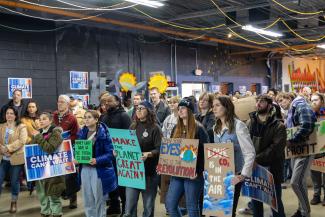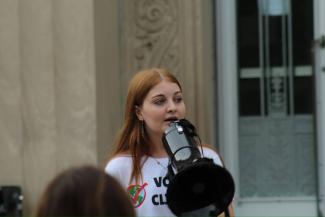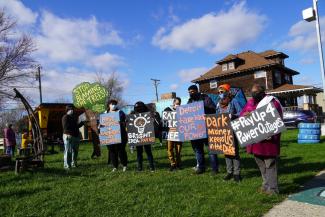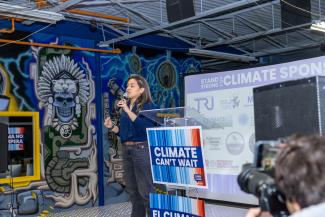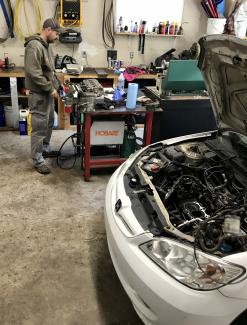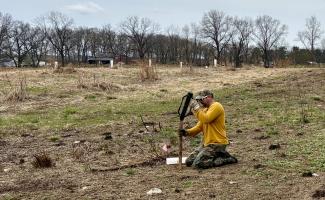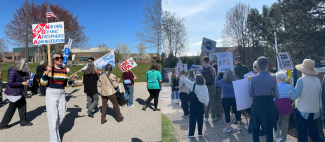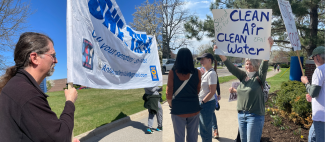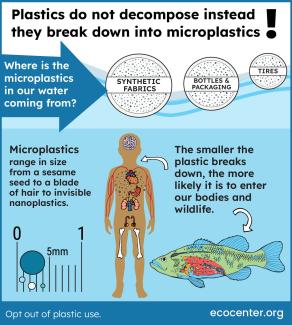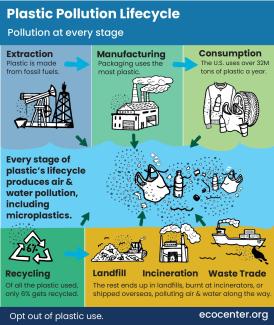By Yuki Nakayama, Ecology Center Environmental Storyteller Rackham Fellow
“The expression ‘it’s just the tip of the iceberg’ is very apt here.” – Jeff Gearhart
We are learning more and more that microplastics are everywhere, even inside our bodies. New studies have found that not only do our brains have roughly a spoonful of microplastic, but they were also found in every human semen sample that was tested. The environmental and health impacts of microplastics have been warned by experts for over a decade. Already, we know that they can cause inflammation and oxidative stress, endocrine disruption, neurotoxicity, organ dysfunction, gut microbiome disruption, cancer, cardiovascular problems, and reproductive health issues.
Jeff Gearhart, Ecology Center Research Director, notes “the expression ‘it’s just the tip of the iceberg’ is very apt here.” These extremely small particles of plastic polymers in our environment pose unique challenges that make data collection and impact assessment difficult and time intensive. There is still more we need to know to find effective solutions to combat this pressing issue.
On February 12, 2025, the International Joint Commission (IJC) and the Great Lakes Science Advisory Board (SAB) organized a webinar on microplastics in the Great Lakes based on data collected by the IJC since 2010 (video of the webinar, presentation slides, and microplastics report.) The IJC was created by a treaty between the U.S. and Canada to influence regulatory decisions made by the two governments. The webinar on the Great Lakes gives us insight into what microplastics pollution is and how it is impacting our local water supply.
The IJC & SAB recommend regulations for monitoring microplastics. Specifically, they recommend that microplastics be included in the Chemicals of Mutual Concern (CMC) similarly to other chemicals like mercury to monitor and regulate them. The CMC is a list of chemicals under the Great Lakes Water Quality Agreement (GLWQA), that are monitored and regulated by federal agencies in both nations (like the EPA in the US). The GLWQA is a joint commitment to protect the Great Lakes by the two nations first signed in 1972. This addition to the CMC is a major development in addressing microplastic pollution in the Great Lakes region.
What are Microplastics?
Plastic is a relatively new material despite the fact that it has become so ubiquitous in our daily lives. Its commercial use increased in the 1950s, which means plastics have been around less than 100 years. People frequently view plastic as inert and harmless because it has become so common.
In the most simplistic terms, Microplastics are small particles of plastic from man-made materials. They are pieces less than five millimeters that are created intentionally (microbeads) and unintentionally (shed through degradation). Particles smaller than one micrometer that are unintentionally produced are frequently referred to as nanoplastics. Microplastics come from various sources that span from manufacturing plastics to daily products we use in our everyday lives such as single-use plastic products (e.g. plastic water bottles, food packaging, take out containers), tire rubber, and synthetic fibers in our clothes.
Due to their small size, they can be transported by wind, water, in and on bodies of animals. These plastic particles can be found all over the world in our environments (air, waters, food) and even in our own bodies. Some of the adverse effects of micro and nanoplastics have been reported, but we still do not know their whole scale. (Check out this website by scientists at Wayne State University that provide accessible infographics on microplastics.)
The two words, microplastics and nanoplastics, cannot be used interchangeably. Micro and nanoplastic need to be understood separately. The data we have so far on microplastics is uneven in terms of materials and size of particles. In many cases, nanoplastics are intentionally excluded from studies. This means findings about microplastics are not easily comparable and do not automatically give insights into nanoplastics. Therefore, we need more research into both micro and nanoplastics.
Alarming Levels of Microplastics
The data collected so far indicate an alarming presence of microplastics. One study found that yearly loads of 44,000-300,000 tons of plastics are already in North American agricultural fields where our food is grown (Nizzetto et al 2016). It is also known that toxic chemicals (like PFAS) and bacteria frequently stick to microplastic particles allowing them to spread widely and even become antibiotic resistant, which creates additional concerns.
In the Great Lakes, microplastics impact aquatic wildlife in two ways:
- Plastics replace food in the gut of the fish or other organisms, leading to malnutrition and even death.
- The particles move into the organism’s tissues (translocation) causing inflammation and oxidative stress.
Dr. Chelsea Rockman noticed that every fish in the Great Lakes had microplastics as opposed to one in four fish in the pacific ocean through her work in both bodies of water. This means the Great Lakes aquatic life is heavily impacted by microplastic pollution. Translocation refers to microplastics eaten by an organism moving beyond the gut. How this happens is still unclear, but data shows that it is happening. This raises serious concern about the impact of translocation on human health, especially in light of finding microplastics in our brains and semen.
Recycling Will Not Solve Our Microplastics Problem.
Plastic recycling programs are unfortunately not the solution to the microplastics problem. They do little to stem the tide of new plastic production. Plastics are not only used in packaging but in consumer and industrial goods, which all end up as waste at the end of their life cycle. Yet only very limited amounts–typically #1 and #2 plastic packaging only–are suitable for recycling. Most plastic waste is incinerated to create more energy. Between 1950 and 2017, over 9,200 million tons of plastics have accumulated across the globe including those that are still in use. Only 700 million tons have been recycled, while 1000 million tons were incinerated and 5,300 million tons were discarded into landfills. These numbers show the fate of plastic products. This is not to say that we should stop recycling, but it highlights the importance of product design and innovations that prevent plastic use in the first place.
Industry is the Biggest Obstacle For Tackling Microplastic Pollution
It is no surprise that one of the biggest obstacles in regulating plastic use and microplastic pollution is push back from plastics manufacturers, waste management companies, the oil industry, and the chemical industry. In particular, the oil industry is growing their profits by expanding their plastic production in anticipation of oil use declining as transportation fuel. Regulations on plastics and microplastics would place stricter producer responsibility on them to invest financially to design safer products with an awareness of their entire life cycle.
“[The solution] should not fall on individual consumers.” – Gillian Miller, Ecology Center Senior Scientist
The industry and consumers also need to be aware of the differences between critical uses and convenient uses of plastic. Gillian Miller, Ecology Center Senior Scientist, warns that the goal should not be to villainize all plastics and the solution is not as simple as completely eliminating plastic because it has many critical uses, especially in medicine and health care. She also emphasized that the solution “should not fall on individual consumers” and industry needs to be held accountable in reducing plastic across various commercial products, especially single-use plastics such as in bottled water.
The Big Takeaway from the IJC & SAB Recommendations
- Develop a regional monitoring program: Already existing monitoring programs should be expanded to include microplastics to protect our crucial bodies of water.
- Support continued research: Developments in tools and methods are still necessary to capture the whole scope of the environmental impact.
- Add microplastics to the Chemical of Mutual Concern list: Adding microplastics to the CMC would require consistent and large-scale monitoring within the Great Lakes Region.
- Enact policies that reduce plastic pollution: Regulating authorities should create stricter policies and standards that help reduce plastic production and use.
(More information by ICJ and SAB in their Webinar video, slides, and supplementary materials )
Policy Action to Fight Microplastic Pollution
Mike Garfield, the director of the Ecology Center, noted that “the scale of what we are facing is vast. We need to come to grips with the fact that plastic use must be reduced” in order to make dramatic interventions. The Ecology Center is working with local partners to advocate for regulations and systemic solutions to this issue (More details in this interview by the WEMU).
The 2024-2025 State of Michigan budgeted two million dollars toward microplastics research. This is a crucial step in fighting microplastic pollution, but establishing stronger regulations is necessary to protect local food and water supplies.
Across the United States, there are statewide bans and restrictions of single-use plastic bags. However, California is the only state to have created a comprehensive statewide strategy to address microplastic pollution. In fact, California is considering adding microplastics as a contaminant in water, which would be a major regulatory move that could lead to more states implementing similarly strict regulations. In Michigan, there are efforts to repeal the ban on local single-use plastic shopping bags and to adopt a statewide microplastics plan similar to the one in California.
In addition to stronger policies, the industry needs to be held responsible for microplastic pollution created by their products. The Ecology is calling for Extended Producer Responsibility (EPR) laws and regulations that make product manufacturers liable for what happens to their products after use. Michigan needs strong EPR laws that include plastics reduction and reuse requirements, along with phase-outs of toxic chemicals.
State laws and local ordinances can make a difference to help build support for large scale systemic changes. While the problem we are facing is daunting, Melissa Sargent, Environmental Health Advocate at the Ecology Center, stated that “trying to take action on multiple levels is important. Working on all levels we can will build into a larger impact.” Like a domino effect, if enough municipalities take localized actions, it can lead to a state level action, that would then lead to a national, regional, and global level movement.
Becoming a Conscientious Consumer
Miller, Gearhart, Garfield, and Sargent, all stressed, the responsibility should be on industry and regulators more than on individual consumers. But there are some consumer level actions that can help reduce microplastic pollution and consumption. Conscientious consumer actions will influence the industry to take this issue more seriously as we show them what is important to us and our future.
- Drinking less bottled water and not heating foods in plastic to reduce individual ingestion of microplastics (more info here).
- Buy less plastic products and products with excessive packaging. Instead, purchase items made using non-plastic materials such as paper, glass, metal, and natural fibers (cotton, wool, and bamboo).
- Support reuse programs and make efforts to reuse what we have by using reusable bags and bringing your own take-out containers to restaurants.
- Do less laundry, put synthetic fabrics in a filtering bag, use products like the Cora Ball, and air dry your clothes.
- Incorporate microplastics filtering tools and systems into your sewage systems.
- Stay informed and participate in actions in your local community. The Huron River Watershed Council has a Take Action page that presents different ways we can individually and collectively take steps to keep our water clean.
- Donate to the Ecology Center. Detailed long term studies as well as advocacy efforts require many people and ample funds to ensure the quality of the data that is collected.































